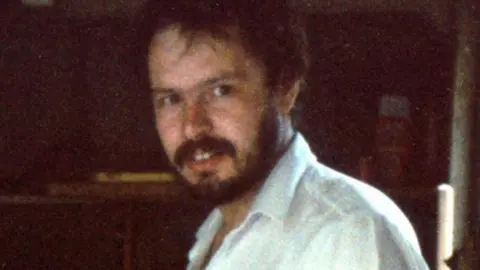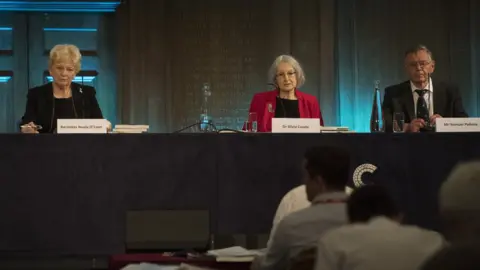Daniel Morgan murder: Met rejects institutional corruption over axe killing
 Metropolitan Police
Metropolitan PoliceThe Metropolitan Police has denied it is institutionally corrupt, in its response to a report on the unsolved murder of a private investigator.
An independent panel made the claim last year but the Met then asked academics to check whether the way the case was policed supported the finding.
The force said only some officers were "vulnerable to corruption" but accepted all nine recommendations of the report.
Daniel Morgan was attacked with an axe in south-east London in 1987.
The inquiry into his death - in the car park of the Golden Lion pub, in Sydenham, aged 37 - was hampered by poor policing and inappropriate links between detectives and those they were investigating.
Mr Morgan's family - who previously decided not to accept an apology offered by outgoing Met Police Commissioner Cressida Dick - said they were "saddened, but not surprised" by the Met's formal response to the report.
They described the force as "paralysed" in relation to the finding of institutional corruption and added: "The commissioner and her team remain unable or unwilling to confront its far-reaching implications."
The family claimed a "culture of corruption, cover-up and denial" continued to "flourish at the highest ranks" of the force and said "neither the home secretary nor the mayor nor those in charge of the IOPC [the Independent Office for Police Conduct] have shown any signs of will or ability to address this crisis".
Despite there having been six investigations and inquiries into Mr Morgan's murder no-one has ever been convicted, which the Met said was a "matter of deep regret".
The Daniel Morgan Inquiry Panel, led by Baroness O'Loan and published last year, said it found evidence of a "form of institutional corruption" within the Metropolitan Police and also said it found evidence that in recent years the force concealed its own failings to protect itself.
In its response to the independent report, the Met said: "We accept that corruption was a major factor in the failings of the first investigation, but we do not accept that we are institutionally corrupt as has been suggested."
But it accepted corruption had been major factor in the failure of the first investigation into Mr Morgan's death and added that there were some officers who "may be vulnerable to corruption" now.
It said it was working hard to "root out corruption".
 PA Media
PA MediaThe force said it was a matter of regret that the relationship with the independent panel had been "marred by disagreement regarding the protocol for sharing sensitive material".
However, it also said it had asked academics to review the charge of "institutional corruption" and said they had concluded it was not justified.
While corruption may have been a factor in the early years, "there was no link to the decisions made in the last decade relating to the disclosure of documents," the Met said.
The force also pointed out there had been a "seismic shift in police and public culture since the Morgan case".
The Met has accepted all nine of the panel's recommendations for the force which include proposals to improve major crime investigations, reduce the risk of conflicts of interest among those leading inquiries, and prevent sensitive information being leaked to the media.
Deputy Assistant Commissioner Barbara Gray, who led the response to the report, said there was "undoubtedly more to do" but said the force would use its response to the report and commitments to build trust and confidence "to be the police service that London deserves".
The Met said it had not given up on Mr Morgan's case and said a new forensic review of evidence had been commissioned.
The Independent Office of Police Conduct said it was undertaking its own assessment of the report.
